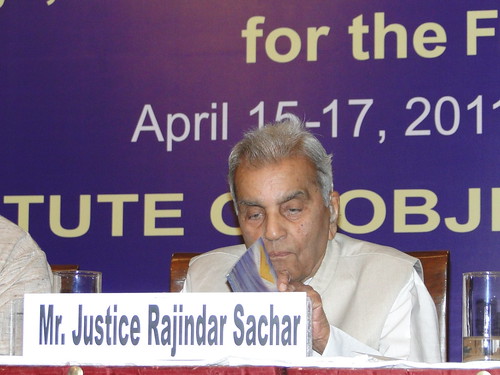By Md. Ali, TwoCircles.net,
New Delhi: Justice Rajindar Sachar has expressed urgent need for the establishment of the Equal Opportunity Commission (EOC). “Today we need a platform that every deprived group can approach in order to sort out their genuine grievances and the proposed EOC can be the best possible platform for that purpose,” said the former chief justice of Delhi High Court while speaking at the second day of the silver jubilee celebration of the Institute Of Objective Studies (IOS) here at India Islamic Cultural Center on Saturday.
At the conference entitled “Towards Knowledge, Development and Peace,” a panel of speakers spoke on the issue of peace in different frameworks. While Justice Sachar and civil rights activist John Dayal interpreted and explained the idea of Peace in political context, eminent social activist Swami Agnivesh talked about peace in terms of society and relationships.

Justice Rajindar Sachar
Justice Sachar, who was also the chairman of the ‘Prime Minister’s High Level Committee For Preparation of Report on Social, Economic and Educational Status of the Muslim Community of India’ (popularly known as Sachar Committee), said, “In the Sachar Committee report we had recommended to the government to establish the EOC, a plan which apparently is pending since.” “Now it’s you who need to find out why the proposal hasn’t yet been realized despite a substantial amount of consensus on the issue,” he further added.
Talking about the idea of peace and the minorities Sachar said that “India is not the monopoly of one religion. The idea that one faith is privileged over the other in India, is completely unacceptable,” Sachar added. He went on to say that “until the moment believers of every faith in India are treated on an equal footing, there can’t be peace in the country in a real sense.”
Talking specifically about Minority rights, Justice Sachar argued that “Muslims deserve an equal status in every sphere and every sector.” India doesn’t need peace brought about by equal rights. Peace at the cost of equality and justice is peace of the graveyard and not the peace which we want.

Abusaleh Shariff, Chief Economist, National Council of Applied Economic Research (NCAER)
Speaking on this occasion Abusaleh Shariff, Chief Economist, National Council of Applied Economic Research (NCAER), said that the governments, union as well as states, need to facilitate mainstreaming of the Muslim mind through education.
Muslim children need to get educated with children of other community and not in a separated atmosphere because that will lead to more alienation and ghettoization, Shariff added.
In an implicit criticism of the community leadership, Shariff, who was the member-secretary of Sachar Committee, said that the government doesn’t solve the problems of the community through a long term policy of standard education but just palliatives of some amount which at best can be described as pittance. But we become happy at that pittance itself.
Swami Agnivesh, on the other hand, talked about peace in terms of social context. Singling out the example of low participation of women in public life, Sawmiji talked about prevalence of caste system specifically among Muslims. “We have got Syed, Shaikh, Pathan, Ansari and the list goes on. While they go to the same mosque, it becomes almost impossible when it comes to intermingling among each other through marriage.”

Eminent social activist Swami Agnivesh
Swamiji criticized the Muslim leadership for its failure to recognize and accept the gravity which the problem of prevalent caste system poses to the larger unity and peace in the minority community, “What is worse is that there is not even a healthy debate on the issue,” rued Swamiji.
Senior journalist John Dayal mainly talked about three issues including, manipulation of information, hijacking of the idea of development and peace at the cost of justice. Dayal said that the idea of peace currently perused by the current political dispensation in the country as well as by the socio-economic elites, is “peace for few and peace by the few.”
Dayal argued that there can’t be any peace in the present scenario when development has been hijacked to make it development for a selected few. There is a need is to talk about inclusive development which alone can bring about peace. There can’t be peace at the cost of justice, he concluded.

